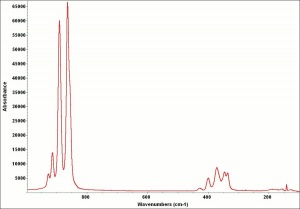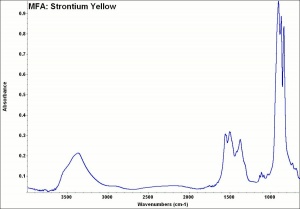Difference between revisions of "Strontium yellow"
| Line 5: | Line 5: | ||
== Synonyms and Related Terms == | == Synonyms and Related Terms == | ||
| − | strontium chromate; Pigment Yellow 32; CI 77839; Strontiumgelb (Deut.); jaune de strontium (Fr.); amarillo de estroncio (Esp.); giallo di stronzio (It.); strontiumgeel (Ned.); amarelo de estrôncio (Port.); lemon yellow; strontium chrome; strontaine yellow; strontian yellow; citron yellow; | + | strontium chromate; Pigment Yellow 32; CI 77839; CAS #: 7789-06-2; Strontiumgelb (Deut.); jaune de strontium (Fr.); amarillo de estroncio (Esp.); giallo di stronzio (It.); strontiumgeel (Ned.); amarelo de estrôncio (Port.); lemon yellow; strontium chrome; strontaine yellow; strontian yellow; citron yellow; |
[[[SliderGallery rightalign|stronyelUCL.jpg~Raman|MFA- Strontium Yellow.jpg~FTIR]]] | [[[SliderGallery rightalign|stronyelUCL.jpg~Raman|MFA- Strontium Yellow.jpg~FTIR]]] | ||
Revision as of 08:47, 25 September 2019
Description
A pale yellow pigment composed of Strontium chromate. Strontium yellow was used in oil paints in the late 19th and early 20th centuries. It has good opacity and stability to light and heat. But because of its high hiding power, strontium chromate was not used in watercolors. Commercially strontium chromate was often mixed with other pigments: a mixture with Prussian blue was sold as green cinnabar and a mixture with Barium yellow and Zinc yellow then sold under the name lemon yellow or citron yellow. Currently, strontium yellow is used in anticorrosive coating and pyrotechnics.
Synonyms and Related Terms
strontium chromate; Pigment Yellow 32; CI 77839; CAS #: 7789-06-2; Strontiumgelb (Deut.); jaune de strontium (Fr.); amarillo de estroncio (Esp.); giallo di stronzio (It.); strontiumgeel (Ned.); amarelo de estrôncio (Port.); lemon yellow; strontium chrome; strontaine yellow; strontian yellow; citron yellow;
Other Properties
Soluble in dilute acids and hot water. Slightly soluble in cold water.
| Composition | SrCrO4 |
|---|---|
| CAS | 7789-06-2 |
| Density | 3.89 |
| Molecular Weight | mol. wt. = 203.62 |
| Refractive Index | 1.92; 2.01 |
Hazards and Safety
May turn green in strong sunlight.
Toxic by ingestion or inhalation. Skin contact may cause allergies. Carcinogenic.
LINK: International Chemical Safety Card
Additional Information
° H. Kuhn, M.Curran, "Chrome Yellow and Other Chromate Pigments", Artists Pigments, Volume 1, R. Feller (ed.), Cambridge University Press: Cambridge, 1986.
Sources Checked for Data in Record
- R. J. Gettens, G.L. Stout, Painting Materials, A Short Encyclopaedia, Dover Publications, New York, 1966
- M. Doerner, The Materials of the Artist, Harcourt, Brace & Co., 1934
- G.S.Brady, Materials Handbook, McGraw-Hill Book Co., New York, 1971 Comment: p. 610
- Ralph Mayer, A Dictionary of Art Terms and Techniques, Harper and Row Publishers, New York, 1969 (also 1945 printing)
- Michael McCann, Artist Beware, Watson-Guptill Publications, New York City, 1979
- The Merck Index, Martha Windholz (ed.), Merck Research Labs, Rahway NJ, 10th edition, 1983 Comment: entry 9001
- Art and Architecture Thesaurus Online, http://www.getty.edu/research/tools/vocabulary/aat/, J. Paul Getty Trust, Los Angeles, 2000

